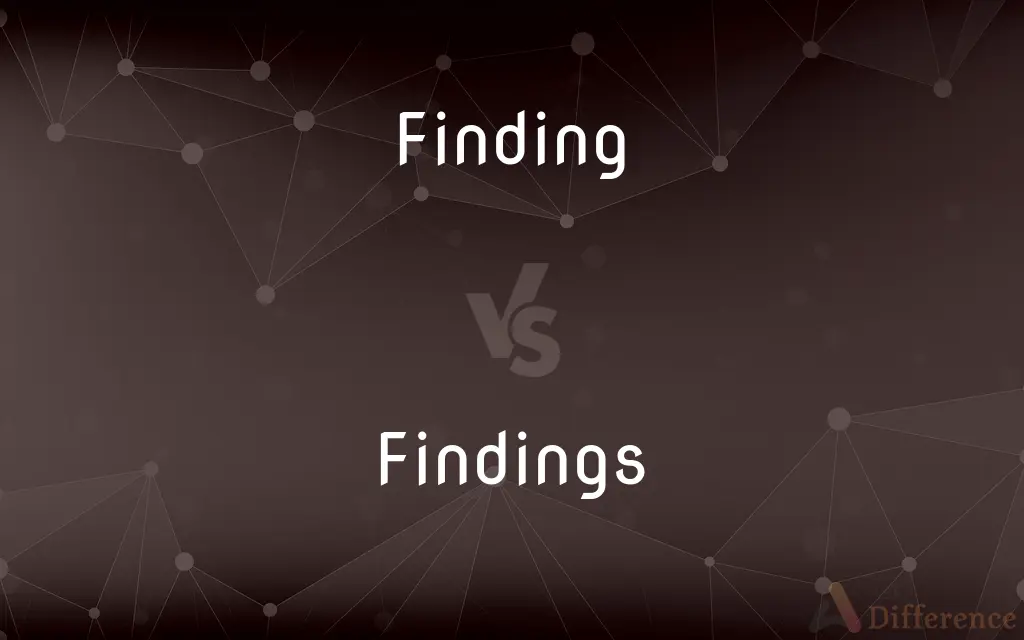Finding vs. Findings — What's the Difference?
By Maham Liaqat & Urooj Arif — Updated on April 2, 2024
Finding refers to the act of discovering something, focusing on the process, whereas findings are the results or conclusions derived from an investigation or research.

Difference Between Finding and Findings
Table of Contents
ADVERTISEMENT
Key Differences
Finding is the action or process of discovering, identifying, or locating something. It emphasizes the journey or effort involved in uncovering something not previously known or recognized. Whereas findings refer to the results, conclusions, or outcomes that are discovered through research, investigation, or any methodical inquiry. These are usually presented after a systematic examination.
Finding often implies a single instance of discovery, such as a moment when something is uncovered or realized. It can be used in various contexts, from everyday life to scientific research. On the other hand, findings are typically used in formal or academic contexts, often relating to multiple discoveries that come out of a structured investigation, study, or audit.
Finding can also suggest a personal discovery that may not necessarily result from a structured process. For example, finding joy in a new hobby. While findings are usually documented and shared outcomes intended for a wider audience, highlighting the importance of the discoveries for understanding a particular issue or subject matter.
Finding embodies the dynamic and ongoing nature of searching or discovering, indicating that the act itself can lead to unexpected or varied results. Whereas findings encapsulate a sense of completion or finality, suggesting that the discoveries have been made, analyzed, and are now being reported.
Finding conveys a broader, more versatile usage, applicable in casual and formal scenarios alike, reflecting the universality of the concept of discovery. While findings often carry a more specialized connotation, specifically tied to the realm of research, investigations, and scholarly work, emphasizing the concrete results derived from such activities.
ADVERTISEMENT
Comparison Chart
Definition
The act of discovering something.
The results or conclusions of an investigation.
Context
Can be informal or formal.
Usually formal, especially in research.
Emphasis
On the process or journey of discovery.
On the outcomes or results obtained.
Usage
Singular and more general.
Plural and often specific to research findings.
Connotation
Dynamic, ongoing, can be personal.
Final, conclusive, often public or shared.
Compare with Definitions
Finding
Discovering something by searching or by chance.
The finding of a rare coin in the backyard was unexpected.
Findings
Results obtained from a scientific study.
The findings were published in a peer-reviewed journal.
Finding
Coming upon a solution or answer.
Finding a cure for the disease has been challenging.
Findings
Discoveries made during an investigation.
The archaeological findings shed new light on ancient civilizations.
Finding
A conclusion reached after examination or investigation.
His finding on the matter was that more research was needed.
Findings
Conclusions drawn from an analysis or inquiry.
The audit's findings led to several policy changes.
Finding
The act of realizing or uncovering something.
Finding peace in nature is his ultimate goal.
Findings
Documented outcomes of research.
His book compiles findings from decades of experimentation.
Finding
Identifying something lost or hidden.
Finding her old diary brought back many memories.
Findings
Evidence or data collected during research.
The findings support the hypothesis of the study.
Finding
(legal) A formal conclusion by a judge, jury or regulatory agency on issues of fact.
Findings
Something that has been found.
Finding
Something that has been found.
Findings
A conclusion reached after examination or investigation
The finding of a grand jury.
A coroner's findings.
Finding
A conclusion reached after examination or investigation
The finding of a grand jury.
A coroner's findings.
Findings
A statement or document containing an authoritative decision or conclusion
A presidential finding that authorized the covert operation.
Finding
A statement or document containing an authoritative decision or conclusion
A presidential finding that authorized the covert operation.
Findings
Findings Small tools and materials used by an artisan
A jeweler's findings.
Finding
Findings Small tools and materials used by an artisan
A jeweler's findings.
Findings
Plural of finding
Finding
A result of research or an investigation.
Findings
Small tools and materials used by artisans and craftsmen
Finding
That which is found, a find, a discovery.
Findings
A collection of tools and other articles used by an artisan to make jewelry or clothing or shoes
Finding
The act of discovering something by chance, an instance of finding something by chance.
Finding
Tools or materials used in shoe making or repair. from 19th century
Finding
(jewelry) A self-contained component of assembled jewellery. from 19th century
Finding
Present participle of find
Finding
That which is found, come upon, or provided; esp. (pl.), that which a journeyman artisan finds or provides for himself; as tools, trimmings, etc.
When a man hath been laboring . . . in the deep mines of knowledge, hath furnished out his findings in all their equipage.
Finding
Support; maintenance; that which is provided for one; expence; provision.
Finding
The result of a judicial examination or inquiry, especially into some matter of fact; a verdict; as, the finding of a jury.
After his friends finding and his rent.
Finding
The act of determining the properties of something
Finding
The decision of a court on issues of fact or law
Finding
Something that is found;
The findings in the gastrointestinal tract indicate that he died several hours after dinner
An area rich in archaelogical findings
Common Curiosities
What is a finding in research?
A finding in research is a discovery, observation, or conclusion that is revealed through systematic investigation.
How do findings differ from conclusions?
Findings are the raw results or data obtained from research, while conclusions are the interpretations or insights drawn from these findings.
Can findings be disputed?
Yes, findings can be disputed, especially if further research presents contradictory evidence or if the methodology of the original research is questioned.
What is the difference between preliminary findings and final findings?
Preliminary findings are initial results shared before the completion of research, while final findings are the comprehensive results after the research is fully analyzed.
Do findings always need to be quantitative?
No, findings can be both quantitative (numerical) and qualitative (descriptive), depending on the nature of the research.
Can the process of finding something be considered a finding itself?
The process can yield important insights, but it's usually the outcomes or discoveries from the process that are termed as findings.
How do researchers validate their findings?
Researchers validate their findings through methods like peer review, replication studies, and statistical analysis to ensure reliability and validity.
How important are findings in a research paper?
Findings are crucial in a research paper as they form the basis for conclusions, discussions, and recommendations, contributing to the overall value and impact of the research.
Are findings the same as evidence?
Findings can be considered a form of evidence, especially when they are used to support hypotheses or theories in research.
Are findings always factual?
Findings are based on the evidence collected during research, but their interpretation can vary, highlighting the importance of methodology and analysis in ensuring accuracy.
How can findings influence policy or practice?
Findings can influence policy or practice by providing evidence-based insights that inform decisions, strategies, and implementations in various fields.
Can a single observation be called a finding?
Yes, a single observation can be considered a finding, especially if it provides significant insight or adds to the understanding of a subject.
How are findings presented in research?
Findings are usually presented in a structured format, often with charts, graphs, or tables, to clearly convey the results of the research.
What role do findings play in theory development?
Findings contribute to theory development by providing empirical evidence that supports, refutes, or refines existing theories.
What happens if findings are inconsistent with previous research?
If findings are inconsistent with previous research, it may prompt further investigation to reconcile the differences, potentially leading to new insights or revisions of existing understanding.
Share Your Discovery

Previous Comparison
Projection vs. Reflection
Next Comparison
Credentials vs. TitleAuthor Spotlight
Written by
Maham LiaqatCo-written by
Urooj ArifUrooj is a skilled content writer at Ask Difference, known for her exceptional ability to simplify complex topics into engaging and informative content. With a passion for research and a flair for clear, concise writing, she consistently delivers articles that resonate with our diverse audience.














































